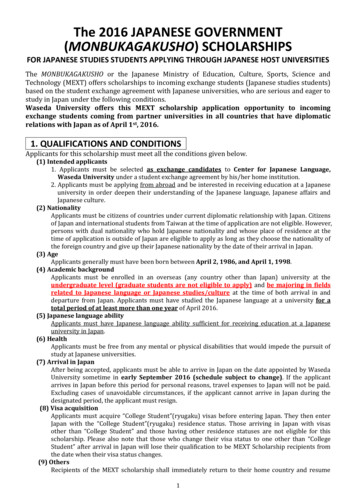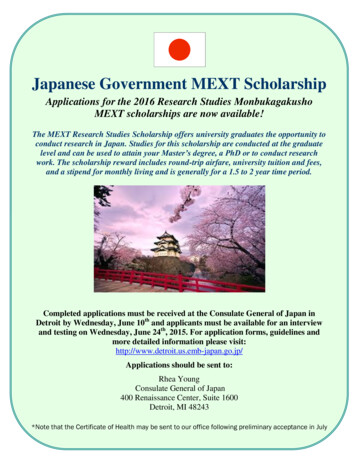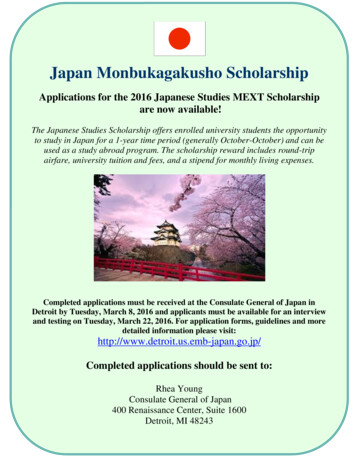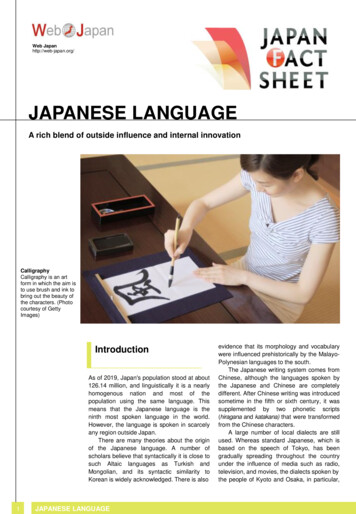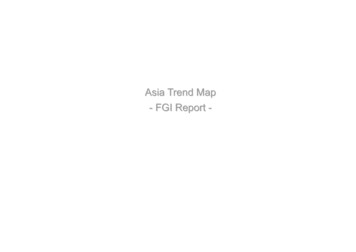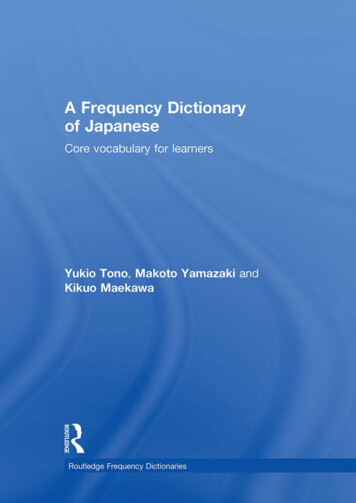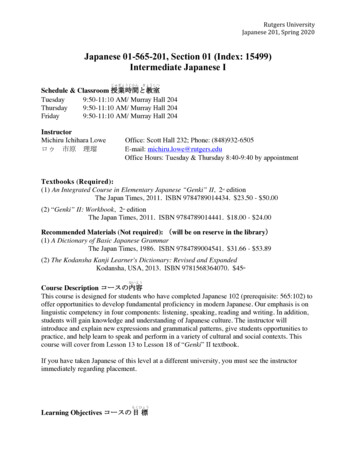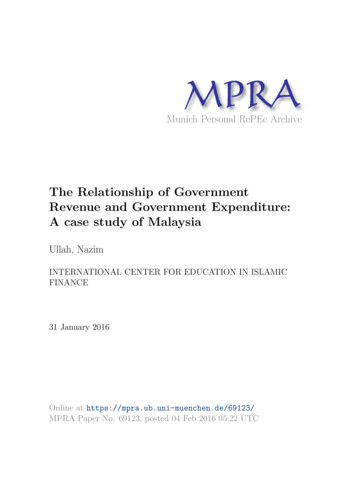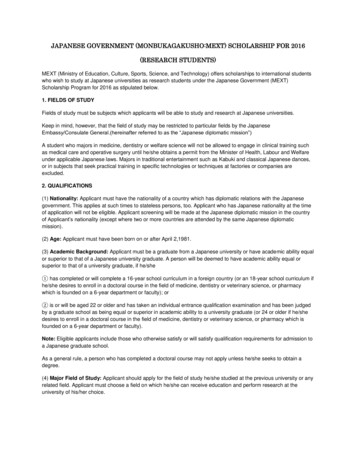
Transcription
JAPANESE GOVERNMENT (MONBUKAGAKUSHO:MEXT) SCHOLARSHIP FOR 2016(RESEARCH STUDENTS)MEXT (Ministry of Education, Culture, Sports, Science, and Technology) offers scholarships to international studentswho wish to study at Japanese universities as research students under the Japanese Government (MEXT)Scholarship Program for 2016 as stipulated below.1. FIELDS OF STUDYFields of study must be subjects which applicants will be able to study and research at Japanese universities.Keep in mind, however, that the field of study may be restricted to particular fields by the JapaneseEmbassy/Consulate General.(hereinafter referred to as the “Japanese diplomatic mission”)A student who majors in medicine, dentistry or welfare science will not be allowed to engage in clinical training suchas medical care and operative surgery until he/she obtains a permit from the Minister of Health, Labour and Welfareunder applicable Japanese laws. Majors in traditional entertainment such as Kabuki and classical Japanese dances,or in subjects that seek practical training in specific technologies or techniques at factories or companies areexcluded.2. QUALIFICATIONS(1) Nationality: Applicant must have the nationality of a country which has diplomatic relations with the Japanesegovernment. This applies at such times to stateless persons, too. Applicant who has Japanese nationality at the timeof application will not be eligible. Applicant screening will be made at the Japanese diplomatic mission in the countryof Applicant’s nationality (except where two or more countries are attended by the same Japanese diplomaticmission).(2) Age: Applicant must have been born on or after April 2,1981.(3) Academic Background: Applicant must be a graduate from a Japanese university or have academic ability equalor superior to that of a Japanese university graduate. A person will be deemed to have academic ability equal orsuperior to that of a university graduate, if he/she① has completed or will complete a 16-year school curriculum in a foreign country (or an 18-year school curriculum ifhe/she desires to enroll in a doctoral course in the field of medicine, dentistry or veterinary science, or pharmacywhich is founded on a 6-year department or faculty); or② is or will be aged 22 or older and has taken an individual entrance qualification examination and has been judgedby a graduate school as being equal or superior in academic ability to a university graduate (or 24 or older if he/shedesires to enroll in a doctoral course in the field of medicine, dentistry or veterinary science, or pharmacy which isfounded on a 6-year department or faculty).Note: Eligible applicants include those who otherwise satisfy or will satisfy qualification requirements for admission toa Japanese graduate school.As a general rule, a person who has completed a doctoral course may not apply unless he/she seeks to obtain adegree.(4) Major Field of Study: Applicant should apply for the field of study he/she studied at the previous university or anyrelated field. Applicant must choose a field on which he/she can receive education and perform research at theuniversity of his/her choice.
(5) Japanese Language: Applicant must be willing to learn the Japanese language, interested in Japan andenthusiastic about deepening his/her understanding of Japan after arriving, and capable of engaging in study andresearch while adapting himself/herself to life in Japan.(6) Health: Applicant must be physically and mentally healthy enough to pursue study at university.(7) Arrival in Japan: Applicant must be able to leave for and arrive in Japan between the 1st and 7th of April 2016,or within two weeks of the date set by the receiving university for the beginning of the semester (in principle, inSeptember or October). Travel expenses will not be provided if the Applicant chooses to travel to Japan before thisset period.(8) Visa Requirement: Selected Applicants must obtain a College Student (ryuugaku 留学) visa from theJapanese diplomatic mission in the country of their nationality, in principle, prior to their arrival in Japan. The visa is tobe issued by the Japanese diplomatic mission in the country of the applicant’s nationality (except where two or morecountries are attended by the same Japanese diplomatic mission). Applicants who are already in Japan under a visaother than the College Student visa are required to change it to the College Student visa by the end of the monthpreceding the start of the scholarship. Applicants who change their resident status to any status other than “CollegeStudent” after their arrival in Japan will immediately lose their status as a Japanese government scholarship student.(9) Any applicant who meets any or all of the following conditions is not eligible. If identified after the start of thescholarship period, the applicant will be required to withdraw from the scholarship:1: The Applicant is an active member of the military or a civilian employed by the military at the time the scholarshipperiod is due to begin.2: The Applicant is unable to travel to Japan within the dates set by the receiving university3: If the Applicant was a grantee of a Japanese Government Scholarship in the past. Unless he/she has had at leastthree years of research or teaching experience between the completion of the first scholarship and the start of thesecond scholarship period. This exclusion will not apply to a research-student applicant, who (i) as an internationalstudent in Japan received training in Japanese studies at a university but graduated from his/her home university,who (ii) was an international student in Japan under the Japan-Korea Joint Government Scholarship Program for theStudents in Science and Engineering Departments or who (ⅲ) was an international student in Japan under theYoung Leaders Program.4: The Applicant is currently enrolled at a Japanese university under the resident status of “College Student,” or ifhe/she plans to enroll at a Japanese university as a privately-financed international student between the time ofapplication for this scholarship and the time the scholarship period is due to begin.5: The Applicant is already the recipient of a scholarship from an organization (including a governmental organizationin his/her country of origin) other than the Japanese government (Ministry of Education, Culture, Sports, Science andTechnology - MEXT).6: The Applicant, considered a “future graduate” and selected as such, is unable to graduate within the pre-set dateor unable to fulfill graduation requirements.3. TERM OF SCHOLARSHIPThe term of scholarship will differ as follows depending on the course a grantee takes in Japan:(1) In a case where Grantee will enroll as a research student, non-degree student, or auditor, etc. (hereinafterreferred to as “Research Student”) after coming to Japan:① If Grantee comes to Japan in April 2016, his/her scholarship will be payable for 24 months from April 2016 throughMarch 2018;
② If Grantee comes to Japan in October 2016, his/her scholarship will be payable for 18 months from October 2016through March 2018.(In either case, the above-mentioned term of scholarship includes a 6-month Japanese language training period forgrantees who require such training)(2) If Grantee enrolls in a master's course, doctoral course, or professional graduate course after coming to Japan,regardless of the time of his/her arrival in Japan the scholarship will be payable for a period necessary for Grantee tocomplete his/her regular course (standard course term). (Plus a 6-month Japanese language training period forGrantee who needs such training.) If Grantee desires to proceed to a regular graduate course from a ResearchStudent course, or to a doctoral course from a master’s course or a professional graduate course, he/she may havethe term of his/her scholarship extended upon successful examination by MEXT provided that he/she has outstandingacademic achievement that meets certain criteria. (Grantee as Research Student cannot have the term of his/herscholarship extended. If Grantee proceeds to a higher level of education without receiving approval for an extensionof the term of the scholarship, the scholarship will be cancelled. He/she may, however, proceed to a higher level ofeducation or continue with his/her study as a privately-financed student.)Please note, however, that proceeding to a regular graduate course from a Research Student course is subject toperiod- related restrictions.Application for extension of stay will not be accepted in the following cases:① Grantee desires to move on to a master’s course in a Natural Science field, but is unable to proceed to a regularcourse by the last day of the 24th month counted from the month of arrival in Japan;② Grantee desires to move on to a master’s course in a Social Science field, but is unable to proceed to a regularcourse by the last day of the 25th month counted from the month of arrival in Japan;③ Grantee desires to move on to a doctoral course in a Natural Science field, but is unable to proceed to a regularcourse by the last day of the 13th month counted from the month of arrival in Japan;④ Grantee desires to move on to a doctoral course in a Social Science field, but is unable to proceed to a regularcourse by the last day of the 24th month counted from the month of arrival in Japan;※ Proceeding to a regular graduate course must meet the above mentioned conditions ①-④, and must take placewithin the term of the scholarship or in the month immediately following the final month of the term of the scholarship.4. SCHOLARSHIP BENEFITS(1) Allowance: Under the fiscal 2012 budget, each grantee will be provided monthly with 143,000 yen (ResearchStudent course), 144,000 yen (students enrolled in a Master’s program or a professional degree program), or145,000 yen (students enrolled in a doctoral program) (an additional monthly stipend of 2,000 or 3,000 yen may beprovided to those undertaking study or research in specially designated regions). However, these amounts aresubject to change depending on the annual budget of each year. The scholarship will not be paid to a grantee whotakes a leave of absence or is long absent from his/her university.Scholarship will be cancelled for a grantee in the following cases. Furthermore, if scholarship payments were madeduring the period the following cases applied, the grantee may be ordered to return scholarship payments receivedduring that period.① If any of his/her application documents is found to be falsely stated;② If he/she is in breach of his/her pledge made to the Minister of MONBUKAGAKUSHO(MEXT);③ If he/she is subjected to disciplinary action, such as expulsion or removal from register, taken by his/her universityor the preparatory Japanese-teaching institution;
④ If it becomes definitive that the grantee will not be able to complete his/her course within the standard course termbecause of his/her poor academic achievement or suspension;⑤ If his/her resident status of “College Student” as provided for in Paragraph 1-4 of Appendix to the ImmigrationControl and Refugee Recognition Act changes to any other status;⑥ If he/she is provided with another scholarship (except for a scholarship designated for research expenses); or⑦ If he/she proceeds to a higher level of education without receiving approval for an extension of the term of thescholarship.(2) Traveling Costs① Transportation to Japan: Each grantee will be provided, according to his/her itinerary and route as designated byMEXT, with an economy class air ticket from the international airport closest to his/her place of residence to NaritaInternational Airport (or following the itinerary normally used by the university where the grantee is placed). Expensessuch as inland transportation from his/her place of residence to the nearest international airport, airport tax, airportusage charges, special taxes on overseas travel and travel expenses within Japan will be borne by the grantee (theplace of residence of the grantee shall in principle be the address stated in the application form). Air travel from acountry other than the country of the grantee’s nationality will not be covered, nor travel to Japan before April 1, 2016.If the grantee comes to Japan to obtain admission to a university, he/she will not be provided with traveling cost toJapan.② Transportation from Japan: The grantee who returns to his/her home country within the last-payment month ofhis/her scholarship will be provided, upon application, with an economy class air ticket for a flight from NaritaInternational Airport (or following the itinerary normally used by the university where the grantee is placed) to theinternational airport closest to his/her place of return.Note: Insurance premiums for travel to/from Japan shall be borne by the grantee. The airport the grantee departsfrom or returns to must be an airport of the country of his/her nationality.③ School Fees: Fees for matriculation, tuition and entrance examinations at a university will be paid by theJapanese government. If the grantee moves on to higher education as a nonregular student or fails the entranceexaminations, he/she will pay for entrance examinations.5. SELECTION AND NOTIFICATION(1) In cooperation with the governments of the applicants’ countries the Japanese diplomatic mission will performprimary screening of applicants by means of submitted application documents, written examinations (language) andinterviews.(2) Written examinations will be English and Japanese tests. The Japanese examination must be taken by allapplicants. and the English by those who wish.(3) The following policy will apply to each screening:① Application documents: Must show that the applicant obtained academic achievement higher than a certain levelat the university he/she last graduated from, and state the applicant’s desired research program in a detailed andconcrete manner.② Written examination: Must show that the applicant obtained scores better than a certain level either in Japaneseor English.③ Interview: Must reveal that the applicant has a clear sense of purpose relating to his/her study in Japan and hasgathered information about Japanese universities. Interview must also reveal that the applicant has sufficientJapanese or English language ability to communicate with his/her adviser in Japan. If the applicant desires to study a
subject that requires higher Japanese language proficiency, Interview must reveal that the applicant has aconsiderable degree of Japanese language proficiency.(4) Results of the primary screening will be notified on the date separately designated by the Japanese diplomaticmission.(5) Each person who has passed this primary screening is required to contact directly the Japanese university ofhis/her choice and obtain admission as a graduate student or research student, or a letter of provisional acceptanceas a research student (hereinafter referred to as “Admission”) by the end of August. In order to obtain Admission,candidates can gain information on office for international students of each university, websites to search universitiesand researchers, etc from the Japanese diplomatic mission.(6) Each candidate must submit to the university of his/her choice a set of the same documents as those submittedto the Japanese diplomatic mission (application, academic transcript of the university attended, research program, allwith a confirmation seal of the Japanese diplomatic mission affixed, and a certificate of the primary selection issuedby the Japanese diplomatic mission). Additional documents may have to be submitted upon request of the university.(7) MEXT will conduct a secondary screening based on the results of the primary screening conducted by theJapanese diplomatic mission, and select as national scholarship grantees those applicants who have found recipientuniversities. Therefore, applicants who have passed the primary screening at a Japanese diplomatic mission are notnecessarily accepted as scholarship grantees.Note 1: A written examination to evaluate Japanese language skills must be taken by all applicants. In addition, anEnglish examination will be provided to those who wish. The result of these examinations will provide a basis fordetermining each applicant’s language ability and will be reflected directly in the screening. The result of the writtenJapanese examination will continue to be used as reference data for Japanese-language instruction due to beprovided upon applicants’ arrival in Japan.Note 2: In particular, if an applicant with limited proficiency in Japanese desires to pursue fields of study such asJapanese linguistics, Japanese literature, Japanese history, or Japanese laws ―fields that require sufficientknowledge of the Japanese language ― he/she will not be selected as a grantee unless there is a very specialsituation.Note 3: This scholarship program is intended for overseas students who wish to enroll in a Japanese university andstudy in japan. It does not accept applicants who wish, from the time of application, to conduct fieldwork outside ofJapan.6. PLACEMENT AND RESEARCH GUIDANCE AT UNIVERSITY(1) Placement of a grantee at a university will be decided following a relevant request made to the university to whicha person who has passed the primary screening obtained admission as a regular student or Research Student at theuniversity’s graduate school (a candidate who has received admission to a regular graduate course will be placeddirectly in such course without needing to pass through a Research Student period). MEXT will, as a matter ofpriority, request the university to receive the grantee, and place him/her there upon its approval.If a candidate wants to enter either a public or a private university, the grantee’s preference specified in theApplication Form (attachment) may not be met due to budgetary reasons concerning school fees, etc. Moreover, anyobjection a candidate may raise to the decision will not be recognized.If a candidate has not obtained admission, MEXT will contact related universities and decide at which university toplace the candidate in consideration of his/her preference. In this case, any objection a candidate may raise to thedecision will not be recognized.In a case where a candidate fails to obtain admission to or a letter of acceptance from a university and MEXTdiscusses the case with related universities, the candidate may still not be accepted and therefore not definitively
selected by MEXT if his/her research program is vague or unclear, the content of his/her research is not substantial,or his/her desired major field presents difficulty from the perspective of research guidance.(2) Research guidance such as lectures, experiments and practical training at universities is basically conducted inJapanese.(3) If a grantee is determined to be insufficiently proficient in the Japanese language, usually he/she will be placed ina university’s Japanese language training institution designated by the university of placement or MEXT as educationin Japanese for the first six-month period after his/her arrival in Japan. Upon completion of the education the granteewill be placed at a university for advanced education. If a grantee has poor achievement in the Japanese languagetraining course and is considered unfit for advanced education at the university, scholarship payment willstop. (See4.(1).)(4) If a grantee is deemed by his/her recipient university as sufficiently proficient in Japanese for conducting his/herresearch in Japan, he/she may be placed in the university as Research Student or a graduate student without goingthrough Japanese-language training.(5) If a grantee desires to move on to a regular graduate course from a Research Student course, or to a doctoralcourse from a master’s course or a professional graduate course, he will be able to do so provided that he/she takesan entrance examination provided by the rele
JAPANESE GOVERNMENT (MONBUKAGAKUSHO:MEXT) SCHOLARSHIP FOR 2016 (RESEARCH STUDENTS) MEXT (Ministry of Education, Culture, Sports, Science, and Technology) offers scholarships to international students who wish to study at Japanese universities as research students under the Japanese Government (MEXT) Scholarship
